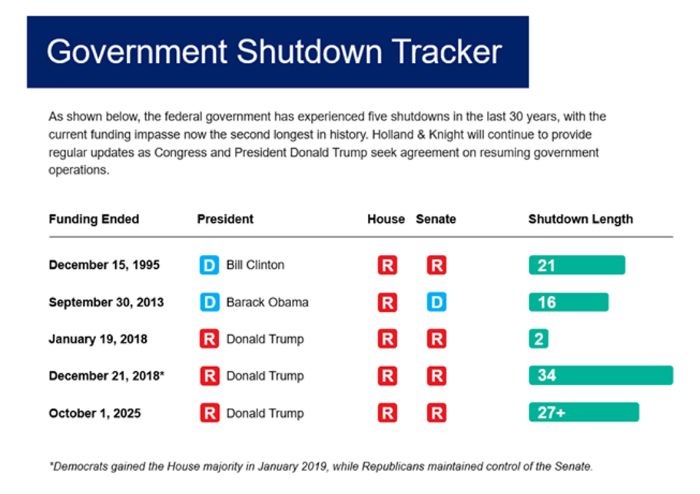- within Government and Public Sector topic(s)
- in United States
Welcome to the Eyes on Washington: Shutdown Briefing. During the federal government shutdown, we will be sharing concise, client-focused updates to help you stay informed on key developments, legislative dynamics and potential impacts to your operations and federal engagement.
Breaking News
The national president of the largest government employee union, representing 820,000 federal and Washington, D.C., government workers, implored members of Congress to pass a short-term continuing resolution (CR) and demanded that they ensure backpay for furloughed employees, address rising costs and fix the appropriations process.
Status Update
Today marks Day 27 of the federal government shutdown. Negotiations on reopening the government remain stalled.
Congressional Activity
- Democratic Leadership: Remains unified in calling for a renewal of Affordable Care Act (ACA) subsidies. As November 1 approaches, Democrats are reportedly hoping that as people see the rise in the price of their healthcare premiums, Republicans will be pressured to renew the subsidies.
- Republican Leadership: Continues to blame Democrats for prolonging the shutdown. U.S. Senate Majority Leader John Thune (R-S.D.) said that a deal will likely come from rank-and-file members. Republican senators, including Ted Cruz (R-Texas) and Dan Sullivan (R-Alaska), are expected to bring separate bills to pay air traffic controllers and active-duty military members, respectively, to the floor this week.
- Bipartisan Engagement: The Senate is holding votes on the CR, cloture and nominations, while the U.S. House of Representatives convenes on a pro forma basis. Several senators have offered piecemeal bills to resolve certain aspects of the shutdown, but none is expected to pass this week.
Executive Branch Developments
- Presidential Engagement: President Donald Trump is scheduled to meet with Japan's emperor and prime minister before traveling to South Korea for the Asia-Pacific Economic Cooperation. The president's absence due to overseas travel has raised concerns that shutdown negotiations will further stall.
- Travel: U.S. Department of Transportation Secretary Sean Duffy announced on October 26 that more than 8,000 flights were delayed across the U.S., an increase from 5,300 the previous day. He warned that staffing shortages and delays will continue to rise as the shutdown continues. Air traffic controllers will miss their first full paychecks on October 28.
- SNAP Funding: The U.S. Department of Agriculture (USDA) published a memo stating that it cannot use a contingency fund worth about $5 billion to maintain Supplemental Nutrition Assistance Program (SNAP) benefits. The memo also declares that if states choose to front the costs themselves, they will not receive federal reimbursement. Virginia Gov. Glenn Youngkin declared a state of emergency on October 23 to draw from the state's budget for SNAP funding. Congressional Democrats sent a letter to the USDA demanding use of the contingency fund.
Key Milestones Ahead
- End of This Week: Funding for several key programs is expected to run out, including Head Start (early childhood education), WIC (the Special Supplemental Nutrition Program for Women, Infants, and Children) and EAS (Essential Air Service payments to small and rural airports). The administration previously shored up the WIC and EAS accounts using available balances elsewhere, but it is unclear if it is willing or able to do so again.
- Late October through November: WIC may begin to experience funding shortfalls. Administration officials are exploring ways to continue WIC and SNAP nutrition benefits, including potentially using tariff revenues.
- October 31: House staff and Pentagon workers are expected to miss their paychecks. Members of Congress will continue to receive pay throughout the shutdown. Pentagon workers likely will be paid again by the administration using available balances in other accounts, as they were on October 15.
- November 1: The ACA open enrollment period begins. The House-passed CR does not include an extension of ACA tax credits, which are set to expire at the end of the year.
- November 1: The USDA said there is insufficient funding to cover November SNAP benefits, affecting 42 million people.
- November 4: Off-year gubernatorial elections are held in Virginia and New Jersey.
- November 7: Non-exempt federal employees will have worked one month without pay.
Strategic Considerations for Clients
- Agency Engagement: Clients should anticipate delays in regulatory reviews, permitting and federal communications.
- Contracting and Grants: Federal contractors may experience payment disruptions and limited access to agency personnel.
- Policy Positioning: The shutdown may create new leverage points in legislative negotiations. Clients with interests in appropriations, healthcare, defense and infrastructure should monitor developments closely.

The content of this article is intended to provide a general guide to the subject matter. Specialist advice should be sought about your specific circumstances.






